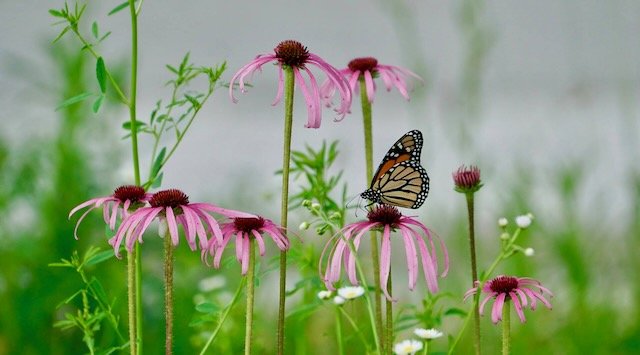It’s not your imagination! You are seeing many fewer numbers and types of insects…especially pollinators. And not just the monarch butterflies everyone is talking about. Windshield surveys of today yield far fewer insect “globs” in need of scraping than those in your parent’s day.
We often take pollinators for granted, but pollinators are critical to our food supply…even in backyard vegetable gardens. And did you know Honeybees don’t pollinate our #1 backyard crop? That’s right! In fact, Honeybees can’t pollinate tomatoes! Some of our native bees are responsible for that…and we have more than 400 species in Missouri!
Explaining why pollinators, especially bees, are so important makes me a bit impatient. The world looks the way it looks, and we eat what we eat to stay healthy, because of native bees and other pollinators. In order to ensure a bountiful vegetable garden, think about providing a pollinator “buffet” throughout the season. Don’t let pollinator guests go home hungry! Entice them to stick around with native plants!
Simple decisions about selecting plants, as well as reducing pesticide use, can make a dramatic difference in your yard and your vegetable garden, where pollination is critical to the best harvest. Native plants are more likely to attract native bees, butterflies, and other pollinators than non-native plants. Non-native plants often do not provide sufficient pollen or nectar to support pollinator populations. And did you know that some popular hybrids, especially double blossoms, produce no pollen or nectar at all! This is a dirty trick if you expect them to stick around and pollinate your vegetables!
Farmers interested in improving crop pollination have begun devoting some areas adjacent to their fields to “bee pastures” or strips that include a range of plants that bloom and provide abundant sources of pollen and nectar throughout spring, summer, and fall. This not only attracts pollinators but also predatory insects that help keep crop pests in check, improving crop quality and reducing the need for pesticides.
Attract a variety of the very best pollinators to your yard by adding native plants of different colors, shapes, and blooming periods. Even a few patio pots of native flowers can boost the number and variety of pollinators available to your vegetable garden.
To purchase quality native plants to attract more pollinators this year, while still practicing social-distancing, check out the Joplin Missouri ~ Native Plant Delivery on April 25 by Ozark Soul Native Plants. And tell your friends about this opportunity to pass the pollinators, too!
By Valerie Frankoski, a founding member of Chert Glades Chapter in 2005, served as an officer, organized training, and is currently Butterfly Coordinator, and a liaison to the City of Joplin in The Mayors’ Monarch Pledge. Val has a BS from Cornell University and an MS in Biological Sciences from Purdue University. She has been paid to work as a middle school science teacher, a horticulturist at a garden center, and a hazardous materials coordinator for a chemical company. Presently, Val volunteers with Friends of Wildcat education programs, speaks to local groups about monarchs and other pollinators, serves on the Wildcat Stream Team, and is cultivating a demonstration garden at Redings Mill Bridge as part of the Chapter’s restoration project. She is an obsessive gardener and has almost never met a native plant she doesn’t like.
Monarda bradburiana, commonly called beebalm, is a common Missouri native perennial. Try mixing perennials with your vegetable beds or planting nearby.
There are many species of sweat bees in several genera in Missouri. All are small; none are aggressive. They can be brightly colored or dark; they can be metallic; their markings vary from green to red to yellow, often with bands similar to those of honeybees. Photo courtesy of Missouri Department of Conservation
Most gardeners meet the black swallowtail sooner or later, because parsley, carrot, fennel, and dill are favorite food plants of the caterpillars. Photo by Missouri Department of Conservation’s Noppadol Paothong
Pollinators are important for many bountiful home vegetable gardens and backyard fruits.

